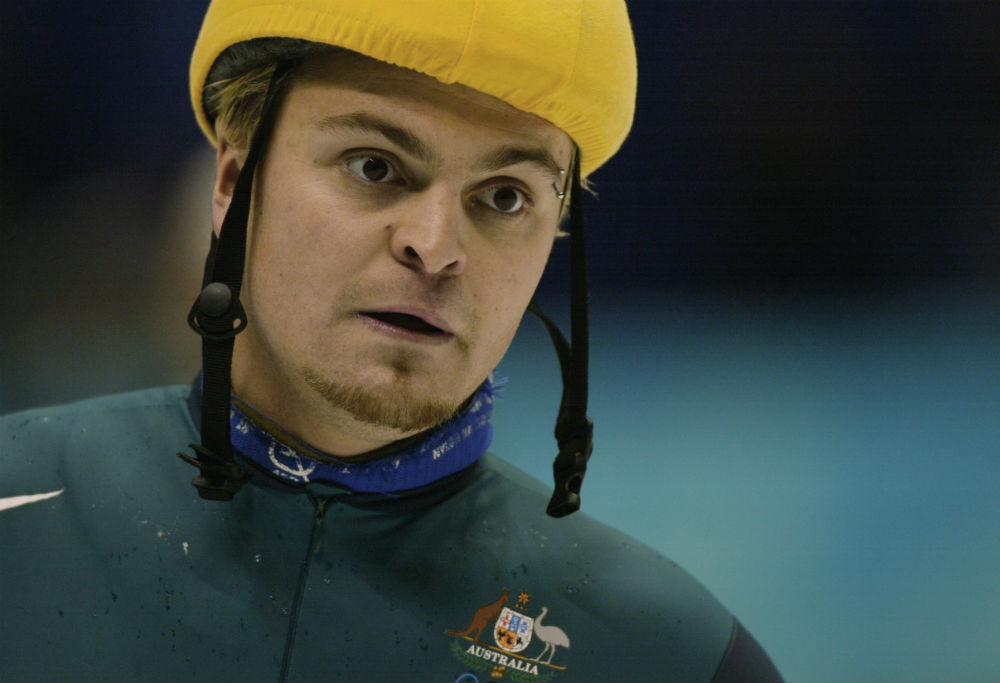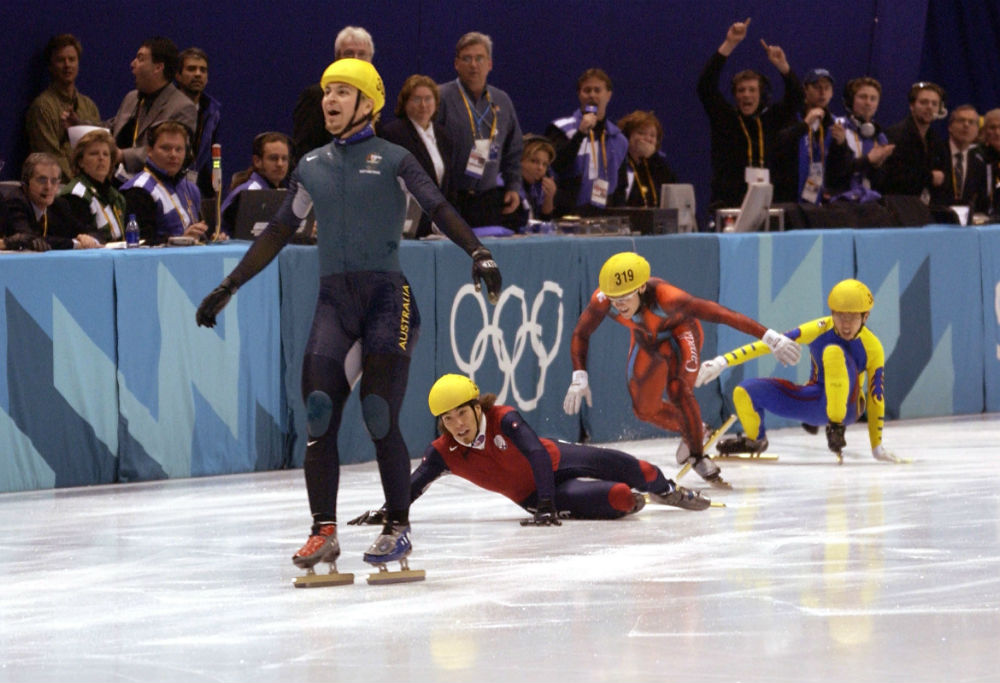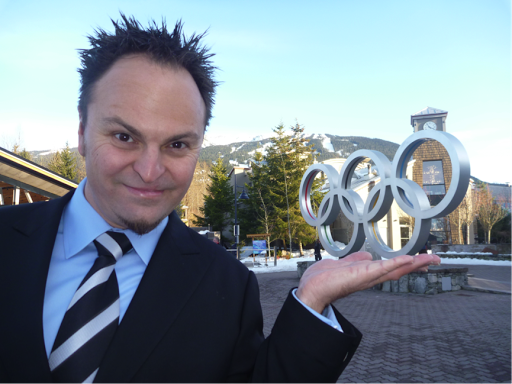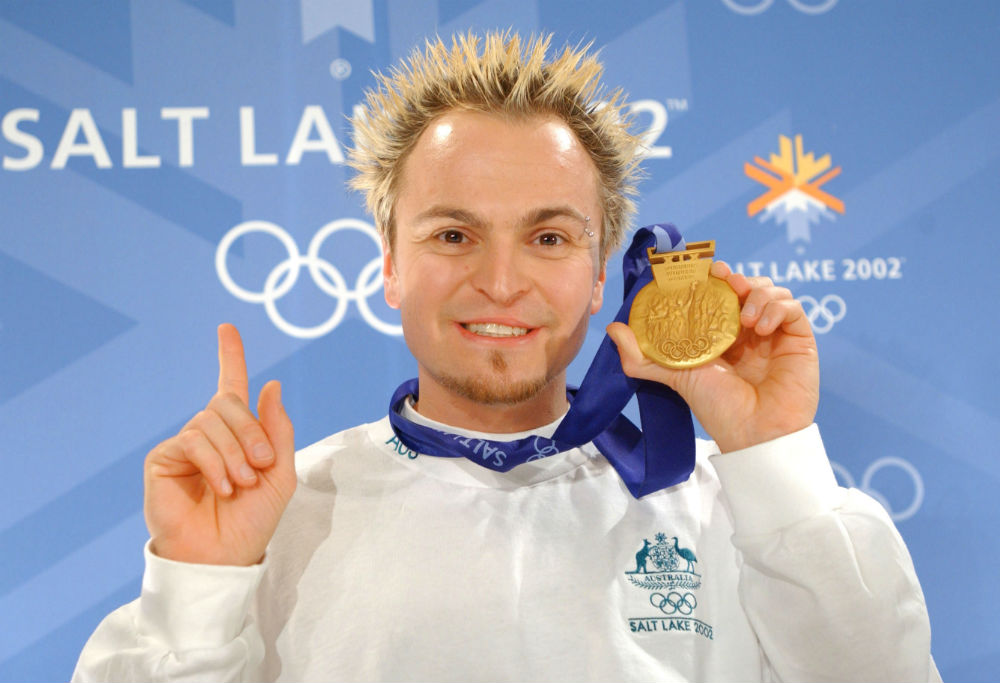'An iconic roster': LeBron, Steph, KD headline all-star cast for Team USA's shot at Olympic glory
LeBron James is going back to the Olympics for the first time in 12 years. Steph Curry is headed to the games for the…
It’s one of the most iconic moments in Australian sport but the full story behind Steven Bradbury’s road to Olympic gold is extraordinary.
‘Doing a Bradbury’ is so entrenched in Aussie folklore and the image of Bradbury raising his arms in Salt Lake City in 2002 after his competitors all fell around him will never be forgotten.
While Bradbury did indeed receive unbelievable luck on that day, many don’t realise he was one of the world’s top speed skaters for years beforehand.
Bradbury experienced the misfortune of crashing out in countless races and so it was almost a sense of destiny that the opposite happened in 2002 as he explained to me in a one-on-one interview.

(Photo by Adam Pretty/Getty Images).
Benjamin Conkey– You would’ve been asked about this a million times, but that feeling when you see everyone on the ice and you’re going through for the first – not just Australian gold medal but the first southern hemisphere gold medal – just talk us through that moment.
Steven Bradbury – Yeah, it was an insane moment. One of the most memorable moments in the history of sport, and I was fortunate to be there at the right place at the right time.
I wasn’t sure if I should put my arms out in the air and celebrate or if I should quickly go and hide in the corner.
I didn’t really know what the appropriate response was at that moment.
Even afterwards, I was sitting in the change rooms – and obviously the look on my face as I went across the finish line tells most of the story, one of disbelief – but I had a few moments before I had to go to the medal ceremony and the media conference and when I was in the change room I wasn’t sure if I was going to either of them because I didn’t know if I wanted to accept the gold medal under those circumstances but after a few minutes I decided yeah I’ll go out on the podium, and I’ll accept this gold medal.
But not for the 90 seconds of the race – I’m going to take it for the 14 years of hard work, five hours a day, six days a week for 14 years. That’s not that lucky, I think I’ll take it for that.

(Steve Munday/Getty Images).
BC – How did the skating come about, because a lot of people play football, and grow up playing cricket in Australia – what about skating?
SB – It’s never going to be the most popular sporting activity in this country, but for me, it was what my family did. My dad was a national speed skating champion back in 1963 and 1964, and I suppose for him, it wasn’t a world championship or an Olympic sport, it was more of a regular hobby, and he got me.
The first time I was on skates I was three years old, and my mum still shows everybody those photos because I’m bawling my eyes out and I hated it, and I didn’t do it again for about three years after that, my dad tells me because I was traumatised.
But when I was about six or seven I started to go back, and eventually I got onto the longer blades of the speed skates, and the speed was what drew me into it – I just wanted to go faster all the time and I developed a passion for it over the years, and later on when I was in my teens I wanted to see if I could be the best in the world.
BC – That was the teenage years before you knew that you could actually make a career out of it?
SB – Yeah, there was a defining moment. I made it into the Australian national team when I was fifteen I went to the world championships in Amsterdam, and I didn’t skate, I was the reserve in the team.
I was watching the men’s 1000m final, and there was a Japanese guy – he was at the back of the pack, his last name was Kawasaki, same as the motorbike – and he started going through the gears, moved on the outside, so he was skating further on the outside.
I remember sitting there in the grandstand watching that, and I thought to myself, I wanna do that.
BC – So what about the ‘91 world champs in Sydney? You got a gold medal there with the relay team.
SB – Yeah, well that was a quick turnaround. it was only a year later after Amsterdam. I was sixteen at that point, and I was, I suppose in some ways fortunate enough to team up with three other seasoned campaigners who were all skating very well at that point.
That was a pretty amazing moment, to win the world championships which were in Sydney. You might say some of the ice conditions weren’t quite suitable for the Europeans, what they may have been used to, but that definitely suited us.
BC – How disappointed you were that you couldn’t get at least an individual medal at the ‘94 and ‘98 Games?
SB – Disappointment is probably an understatement. I was the favourite for the 1000m event in ‘94 and four years later in Nagano, Japan, I was ranked fifth in the world – not the favourite, but a reasonable chance to be standing on the podium somewhere.
Two days before the 1000m event, I got probably the worst case of food poisoning that I’ve ever had in my life.
I skated, but I it didn’t even feel like my legs were in Japan and I don’t even know where I finished.

BC – And speaking of setbacks, the first major injury was ‘94, the World Cup, which was after the Olympics, and that was one of the most horrendous injuries a skater – a nightmare for a skater – just talk us through what happened.
SB – I was unfortunate enough to get impaled on the back of another guy’s blade.
He was down on one knee, I did sort of a sideways flip in the air, and I just went straight onto his blade and it went clean through my right leg.
Went in one side, came out the other and then ripped straight back out through my right quad. A person of my size – back then I had about five and a half litres of blood, I’ve got maybe about six these days (laughing) – I lost four litres of blood in about 60 seconds.
I remember lying on the ice there in Canada and I thought to myself, if you lose consciousness, you’re going to die.
And for me now, it’s amazing, and I like to share with other people the amount of power that a human being – any human being – can draw upon when they’re put into a life or death situation like that because if you’re able to harness a little bit of that sort of power when you go to training or you go to work every single day, then your results are going to be way better.
BC – What about the confidence getting back for those next two years, was it hard to skate with your leg as it was, with 112 stitches?
SB – Yeah well, the stitches came out in a couple of weeks so they were left behind fairly quickly but it took me about 18 months to get all of the strength back in my right leg. And it’s funny, I raced at the world championships four months after the crash and I only had 64% of the strength in my leg and I finished 12th in the world.
And then I went back to the world championships next time at 100% strength back into my right leg and I finished 13th. Doesn’t quite work out exactly how you plan it to, does it?
BC – No. Then in 2000, you had another setback which was two years before the gold medal, you broke your neck in a training mishap just when you were getting back on track?
SB – Yeah, it was actually 20 months before I won the gold medal. I had a crash at Acacia Ridge and I fractured the c4, c5 and c6 in a training crash so technically I broke my neck, and they screwed a halo brace into my head. You might be able to see the scars above my eyebrows where they screw it in – two in the back and a ring around the top. I had to wear that thing for about two and a half months.
BC – Did you think your career was over at that stage?
SB – I had flashing moments of that, and I had a lot of time to think. Two and a half months, and I think a lot of people – or most people – are guilty of not taking enough time out of their daily routine to think about big picture, why they really started what they’re doing in the first place, and whether their goals and motivations are still the same. For me, I had two and a half months to do that and I evaluated my whole career up until that point.
I skated at three Winter Olympics games and I hadn’t done my best at any of them, and I decided that big picture thinking told me that I only had 18 months to go after they take this halo brace off my head, and 18 months of hard work out of 14 years isn’t that much. So if I don’t do it, then I’ll kick myself for the rest of my life. Do you think everyone around me was saying that? They were telling me to give up.
I nearly bled to death on the ice, and now I was lucky to not be in a wheelchair. The doctor who screwed that thing into my head told me I’d never skate again – I just went to another doctor.

(John Gichigi/Getty Images)
BC – Was that was the motivation? To prove people wrong?
SB – At the point, it wasn’t about proving anything to anyone except for me. I invested most of my life into the sport and through most of that time, it was about winning a gold medal.
But realistically, those days had passed me by. I just wanted to get into those fourth Olympics and have one last shot at skating my best while the whole world was watching me because in speed skating the whole world only watches once every four years.
I think that’s all anybody can really ask of anyone, just to put in our best every day whether you win a gold medal or you make a million bucks, achieve your goals, as long as you got that personal satisfaction from doing your best every day along the way, that’s what the real win is any way.
BC – So in 2002, you make it to the quarter-finals. Was that sort of a success as it was when you saw that the two best skaters in the world were alongside in the quarter-final? And did you think you had any chance of getting through at that stage?
SB – I looked at the other names in the quarter-final and I thought to myself, I don’t think I can beat any of them. But my best legs showed up in that quarter-final, and it had taken my four Olympics to do it. I used my speed and my acceleration at the perfect moment, and I skated better than I had in years.
I finished in second place – if you finish in first or second you go through to the next round – Apolo Ohno, the American, he’s the favourite, he finished in first, I’m second.
Third is Marc Gagnon from Canada, four-time world champion. I hadn’t beaten that prick for eight years! But on that day I got him. He’s out, and I’m going through to the semis, and I’m bloody stoked.
BC – And the tactics – was that always the case of holding back from that point on? And just waiting for a mistake?
SB – Well, that was from that point on. I was 28 years old, not just the oldest skater in the semifinals or the final, but the oldest skater in the entire Olympic field. The draw came out for the semifinals, we had five skaters so I’m racing against four other guys.
One skater had been advanced due to a disqualification in one of the quarters and I had a look at the other names, and I thought, well honestly, I don’t think I can beat any of these blokes. I had a chat with my coach about it. A little Chinese lady, her name is Ann Zhang, and she agreed with me.
The rest is history.